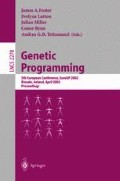Abstract
This report represents an initial investigation into the use of genetic programming to solve the N-prisoners puzzle. The puzzle has generated a certain level of interest among the mathematical community. We believe that this puzzle presents a significant challenge to the field of evolutionary computation and to genetic programming in particular. The overall aim is to generate a solution that encodes complex decision making. Our initial results demonstrate that genetic programming can evolve good solutions. We compare these results to engineered solutions and discuss some of the implications. One of the consequences of this study is that it has highlighted a number of research issues and directions and challenges for the evolutionary computation community. We conclude the article by presenting some of these directions which range over several areas of evolutionary computation, including multi-objective fitness, coevolution and cooperation, and problem representations.
Access this chapter
Tax calculation will be finalised at checkout
Purchases are for personal use only
Preview
Unable to display preview. Download preview PDF.
References
W.F. Punch, D. Zongker, and E.D. Goodman. The roya tree problem, a benchmark for single and multi-population genetic programming. In P.J. Angeline and K.E. Kinnear, Jr., editors, Advances in Genetic Programming 2, chapter 15, pages 299–316. The MIT Press, Cambridge, MA, 1996.
W.B. Langdon. Data Structures and Genetic Programming:Genetic Programming + Data Structures =Automatic Programming!, volume 1 of Genetic Programming. Kluwer, Boston, 24 April 1998.
J.R. Koza. Genetic Programming: On the Programming of Computers by Means of Natural Selection. MIT Press, Cambridge, MA, USA, 1992.
J. Koza, F. Bennett, and D. Andre. Using programmatic motifs and genetic programming to classify protein sequences as to extracellular and membrane cellular location. In V. William Porto et al, editor, Proceedings of the Seventh Annual Conference on Evolutionary Programming, volume 1447 of LNCS, San Diego, California, USA, 25–27 March 1998. Springer-Verlag.
J.M. Daida, J.A. Polito, S.A. Stanhope, R.R. Bertram, J.C. Khoo, and S.A. Chaudhary. What makes a problem GP-hard? analysis of a tunably difficult problem in genetic programming. In Wolfgang Banzhaf et al, editor, Proceedings of the Genetic and Evolutionary Computation Conference, volume 2, pages 982–989, Orlando, Florida, USA, 13–17 July 1999. Morgan Kaufmann.
S. Luke. Genetic programming produced competitive soccer softbot teams for robocup97. In J.R. Koza et al, editor, Genetic Programming 1998: Proceedings of the Third Annual Conference, pages 214–222, University of Wisconsin, Madison, Wisconsin, USA, 22–25 July 1998. Morgan Kaufmann.
D. Andre and A. Teller. Evolving Team Darwin United. In M. Asada and H. Kitano, editors, RoboCup-98: Robot Soccer World Cup II, volume 1604 of LNCS, pages 346–351, Paris, France, July 1998 1999. Springer Verlag.
S.M. Gustafson and W.H. Hsu. Layered learning in genetic programming for a co-operative robot soccer problem. In J.F. Miller et al, editor, Proceedings of the European Conference on Genetic Programming, volume 2038 of LNCS, Lake Como, Italy, April 2001. Springer-Verlag.
T. Soule, J.A. Foster, and J. Dickinson. Using genetic programming to approximate maximum clique. In J.R. Koza et al, editor, Genetic Programming 1996: Proceedings of the First Annual Conference, pages 400–405, Stanford University, CA, USA, 28–31 July 1996. MIT Press.
T. Ebert. Applications of Recursive Operators to Randomness and Complexity. Ph.D. thesis, University of California at Santa Barbara, 1998.
T. Ebert. On the autoreducibility of random sequences. Unpublished. http://www.ics.uci.edu/.ebert/, 2001.
S. Robinson. Why mathematicians now care about their hat color. The New York Times:Science Desk, 10 April 2001.
R.W. Hamming. Coding and Information Theory. Prentice-Hall, Inc, New Jersey, USA, 1980.
S. Luke. Issues in Scaling Genetic Programming: Breeding Strategies, Tree Generation, and Code Bloat. PhD thesis, Department of Computer Science, University of Maryland, University of Maryland, College Park, MD 20742 USA, 2000.
J.D. Knowles, R.A. Watson, and D.W. Corne. Reducing Local Optima in Single-Objective Problems by Multi-objectivization. In E. Zitzler et al, editor, First International Conference on Evolutionary Multi-Criterion Optimization, pages 268–282. Springer-Verlag. LNCS no. 1993, 2001.
Author information
Authors and Affiliations
Editor information
Editors and Affiliations
Rights and permissions
Copyright information
© 2002 Springer-Verlag Berlin Heidelberg
About this paper
Cite this paper
Burke, E., Gustafson, S., Kendall, G. (2002). A Puzzle to Challenge Genetic Programming. In: Foster, J.A., Lutton, E., Miller, J., Ryan, C., Tettamanzi, A. (eds) Genetic Programming. EuroGP 2002. Lecture Notes in Computer Science, vol 2278. Springer, Berlin, Heidelberg. https://doi.org/10.1007/3-540-45984-7_23
Download citation
DOI: https://doi.org/10.1007/3-540-45984-7_23
Published:
Publisher Name: Springer, Berlin, Heidelberg
Print ISBN: 978-3-540-43378-1
Online ISBN: 978-3-540-45984-2
eBook Packages: Springer Book Archive

